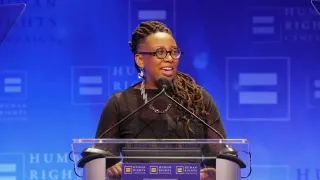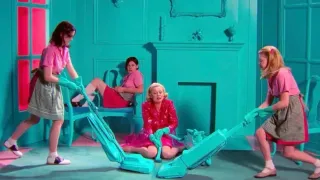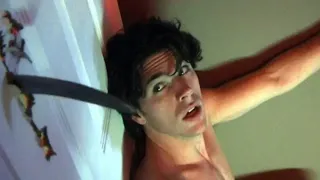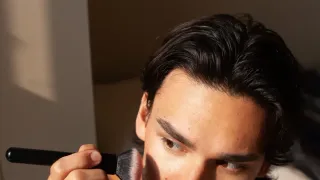June 4, 2014
The Rainbow Road in 'Silicon Valley'
Jason St. Amand READ TIME: 5 MIN.
The first season of HBO's new show "Silicon Valley" wrapped up Sunday with its main characters, a group of gangly white male nerds who range from effeminate spazoids to overly confident doofuses, scoring a big win at an important tech conference. The group came out on top for their game-changing app and predictably beat their Google-like rivals, Hooli. But what sparked Richard Hendricks (Thomas Middleditch), group's leader and the "mastermind" behind the Pied Piper app, to alter the app at the eleventh hour was an elaborate, but hilarious, gay-ish dick joke.
In the season finale, "Optimal Tip-to-Tip Efficiency," entrepreneur Erlich Bachman (T.J. Miller), who funded Pied Piper when it was basically useless, wondered how many dicks he could jack off at the conference, TechCrunch Disrupt. The rest of the group, Gilfoyle (Martin Starr) and Dinesh Chugtai (Kumail Nanjiani), kicked into mega-nerd gear and came up with a super-complex theoretical equation of how to get the optimal dicks jacked in a period of time, or "mean jerk time."
Their deadpan explanation of how to get the highest amount of penises serviced is priceless, a little questionable, but not uncommon. Throughout the eight-episode season one of "Silicon Valley," gay jokes run rampant but never carry a hint of homophobia. Though the sitcom comes off as one of the straightest shows on TV, it proves to be anything but from the very first episode, "Minimum Viable Product": a joke about Grindr is made -- Erlich says he owns a small percent of the "the men dating site where you can find other men within 10-miles of you, interested in having sexual intercourse in a public restroom" and Gilfoyle imagines what cum tastes like.
In another episode, the original logo design for Pied Piper is scrutinized, with Dinesh saying, "it looks like a guy sucking a dick and he's got another dick tucked behind his ear for later -- like a snack dick." In another, a street artist paints a mural of Erlich having sex with Dinesh on the groups' garage and later on, Dinesh unknowingly falls in love with Gilfoyle's code ("You're gay for my code!") and Richard's ex mistakenly thinks he's promiscuous gay man.
Though these jokes aren't at the center of "Silicon Valley," they are certainly the sitcom's backbone, along with the topical ribbing at California's real Silicon Valley and the ridiculousness of today's technology.
The number of gay jokes in season one make more sense since the series was co-created by Mike Judge, best know for his masterpieces "Beavis and Butt-head," "Office Space" and "King of the Hill," which gave us the openly flamboyant, but pretty straight character, Bobby Hill. Judge has proved that he has an uncanny understanding of specific niche cultures, predominately straight white males, and there's no exception when it comes to "Silicon Valley."
Most of my close friends happen to be straight white guys, who also happen to be computer programmers, engineers and coders. One of my closest friends lives in Palo Alto, right in the heart of Silicon Valley. And unsurprisingly, thanks to Judge's insight into these sub-communities, my five real life friends mirror the five pals in "Silicon Valley" in a lot of ways.
Some are way too cocky for their own good; others are on the opposite end of the spectrum and are sensitive and too awkward to function in normal everyday situations. But a common thread they share is they are all accepting and have an interesting (fluid?) take on sexuality.
Two of my friends have an unbreakable bromance, and were pretty much inseparable since grade school until one of them was forced to move to Palo Alto for a tech job. Another friend said he watches transgender porn without blinking an eye and another drunkenly told me he's fooled around with a gay guy before. The friend who moved to Palo Alto took me to San Francisco gay pride a few years ago and he was totally open to the experience.
A lot of the gags on "Silicon Valley," and my real life friend's attitudes, are rooted in Internet humor and meme culture, I believe. Some of my friends dwelled in the bowels of the web, spending hours on 4Chan, an image message board known for it's sub-forum, /b/, where users affectionately refer to each other as "fags." It's also where the hacktivist group Anonymous comes from.
Reddit, a news/social media site, attracts a similar crowd of nerdy males, who are bombarded and desensitized by dick jokes, graphic images (often times gay porn) and can anonymously be open with each other about their thoughts and feelings about sex and sexuality.
It's not surprising if these attitudes have flowed over to their real life and are shared amongst friends who probably hangout on these same sites. 4Chan, Reddit and the like sites are never brought up on "Silicon Valley," though -- it's something I'm inferring about the characters on the show, based on real life experiences of friends who are in the same field.
It's also possible we've just crossed the threshold and straight men telling gay jokes are A-OK.
Nevertheless, the gay and dick jokes in "Silicon Valley" are never taken to a cruel place and are universally funny, not offensive -- even when made by straight nerds. The gags actually make the show more inclusive; like Judge's other shows, "Silicon Valley," succeeds because it captures a zeitgeist many of us aren't completely aware of: Every now and then a news story pops up about a 20-something becoming an over night success and a multi-millionaire because he developed a revolutionary app or a code we really don't understand. But that's "Silicon Valley" on paper, and many of us may be turned off by a group of straight men in the tech industry -- I found myself skeptical at first, asking myself, "what can be funny about this show?"
While "Silicon Valley" may be somewhat formulaic, it's the strong writing and clever joke-telling that has me hooked -- once I heard the crack about Grindr, I was sold. Hopefully season two is just as gay.






